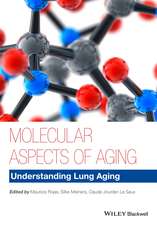Studies on Psychiatric Disorders: Oxidative Stress in Applied Basic Research and Clinical Practice
Editat de Anna Dietrich-Muszalska, Ved Chauhan, Sylvain Grignonen Limba Engleză Hardback – 3 ian 2015
Written by leading researchers in their fields, Studies on Psychiatric Disorders explores therapeutic approaches with aspects of various antioxidants, cryostimulation, and hyperbaric oxygen treatment in oxidative stress in neuropsychiatric diseases. The volume also discusses the role of antipsychotics in the treatment of schizophrenia on nitric oxide generation and biomarkers of oxidative stress together with the clinical symptomatology. Overall, it proposes that novel therapeutic strategies such as supplementation with antioxidants—in particular polyphenols, ω-3 fatty acids orcombination of both—could be effective for long-term treatment of some neuropsychiatric disorders.
| Toate formatele și edițiile | Preț | Express |
|---|---|---|
| Paperback (1) | 808.98 lei 38-44 zile | |
| Springer – 24 sep 2016 | 808.98 lei 38-44 zile | |
| Hardback (1) | 965.97 lei 6-8 săpt. | |
| Springer – 3 ian 2015 | 965.97 lei 6-8 săpt. |
Din seria Oxidative Stress in Applied Basic Research and Clinical Practice
- 5%
 Preț: 1483.21 lei
Preț: 1483.21 lei - 18%
 Preț: 1272.98 lei
Preț: 1272.98 lei - 18%
 Preț: 1007.65 lei
Preț: 1007.65 lei - 18%
 Preț: 1843.73 lei
Preț: 1843.73 lei - 18%
 Preț: 1667.12 lei
Preț: 1667.12 lei - 18%
 Preț: 1242.52 lei
Preț: 1242.52 lei - 15%
 Preț: 695.70 lei
Preț: 695.70 lei - 15%
 Preț: 700.94 lei
Preț: 700.94 lei - 18%
 Preț: 1235.43 lei
Preț: 1235.43 lei - 18%
 Preț: 1560.73 lei
Preț: 1560.73 lei - 18%
 Preț: 1225.94 lei
Preț: 1225.94 lei - 18%
 Preț: 951.29 lei
Preț: 951.29 lei - 18%
 Preț: 959.98 lei
Preț: 959.98 lei - 18%
 Preț: 953.65 lei
Preț: 953.65 lei - 18%
 Preț: 966.27 lei
Preț: 966.27 lei - 18%
 Preț: 958.07 lei
Preț: 958.07 lei - 15%
 Preț: 654.95 lei
Preț: 654.95 lei - 18%
 Preț: 954.45 lei
Preț: 954.45 lei - 18%
 Preț: 961.41 lei
Preț: 961.41 lei - 18%
 Preț: 962.18 lei
Preț: 962.18 lei - 24%
 Preț: 826.77 lei
Preț: 826.77 lei - 20%
 Preț: 562.85 lei
Preț: 562.85 lei - 18%
 Preț: 1243.46 lei
Preț: 1243.46 lei - 18%
 Preț: 1010.96 lei
Preț: 1010.96 lei
Preț: 965.97 lei
Preț vechi: 1178.01 lei
-18% Nou
Puncte Express: 1449
Preț estimativ în valută:
184.83€ • 192.98$ • 152.98£
184.83€ • 192.98$ • 152.98£
Carte tipărită la comandă
Livrare economică 05-19 aprilie
Preluare comenzi: 021 569.72.76
Specificații
ISBN-13: 9781493904396
ISBN-10: 1493904396
Pagini: 616
Ilustrații: XX, 596 p. 31 illus., 17 illus. in color.
Dimensiuni: 155 x 235 x 38 mm
Greutate: 1.03 kg
Ediția:2015
Editura: Springer
Colecția Humana
Seria Oxidative Stress in Applied Basic Research and Clinical Practice
Locul publicării:New York, NY, United States
ISBN-10: 1493904396
Pagini: 616
Ilustrații: XX, 596 p. 31 illus., 17 illus. in color.
Dimensiuni: 155 x 235 x 38 mm
Greutate: 1.03 kg
Ediția:2015
Editura: Springer
Colecția Humana
Seria Oxidative Stress in Applied Basic Research and Clinical Practice
Locul publicării:New York, NY, United States
Public țintă
Professional/practitionerCuprins
1. Oxidative nitrative and chlorinative stress: biomarkers.- Part 1. Clinical aspects.- 2. Oxidative stress in schizophrenia.- 3. Oxidative stress in bipolar disorders.- 4. Contribution of oxidative stress to the pathophysiology of autism spectrum disorders: Impact of genetic and environmental factors.- 5. Oxidative stress and anxiety disorder.- 6. The relationship between oxidative stress and obsessive- compulsive disorder.- 7. A relationship between oxidative status and attention deficit hyperactivity disorder.- 8. The role of oxidative stress in neurodegenerative diseases.- Part 2. Pathophysiological aspects.- 9. Magnetic resonance spectroscopy studies in Bipolar Disorder patients: Focus on the potential role of oxidative stress.- 10. The impact of oxidative stress on dopaminergic neurotransmission.- 11. The reciprocal effects of oxidative stress and glutamate neurotransmission.- 12. Mitochondrial dysfunction in psychiatric disorders.- 13. The kynurenine pathway at the interface between neuroinflammation, oxidative stress and neurochemical disturbances: Emphasis in schizophrenia.- 14. Dysregulation of glutathione synthesis in psychiatric disorders.- 15. Role of nitrative stress in brain of schizophrenic patients.- 16. Blood platelet as a peripheral cell in oxidative stress in psychiatric diseases.- 17. Mitochondrial dysfunction in autism.- 18. Ultrasound and Autism: How Disrupted Redox Homeostasis and Transient Membrane Porosity Confer Risk.- 19. Animal Model of Autistic Regression: Link to Toxicant-Induced Oxidative Stress.- 20. Genetic Polymorphism Related to Oxidative Stress in Autism.- 21. Telomere length in major psychiatric disorders. Is there any relationship between telomere length and oxidative stress?.- 22. The impact of oxidative stress on GAD67 levels and parvalbumin - positive neurons.- 23. The possible role of iron in neurodegeneration.- 24. Oxidation stress and polyunsaturated lipid peroxidation products in the CNS: focus on DHA-derived fragment.- Part 3. Therapeutic aspects.- 25. Antioxidant interventions in neuropsychiatric disorders.- 26. Antioxidant plant polyphenols and cognitive disorders.- 27. Hyperbaric oxygen treatment in autism spectrum disorders.- 28. Effects of lithium on oxidative stress.- 29. Cryostimulation as adjunct treatment in psychiatric disorders.- Index.
Notă biografică
Anna Dietrich-Muszalska is a professor of psychiatry and head of the Department of Biological Psychiatry of the Chair of Experimental and Clinical Physiology, Medical University of Lodz, Poland, where she obtained her PhD in psychiatry, her MD specializing in psychiatry and child and adolescent psychiatry, and received her training in clinical psychiatry. She worked in the Clinic of Child and Adolescent Psychiatry prior to working for several years in the Clinic of Affective and Psychotic Disorders, Medical University of Lodz. She is also head of the Centre of Prevention and Treatment Addiction of Narcotics in Lodz. Her research interest concerns the development of new and improved treatments of schizophrenia. Her clinical research focuses on understanding the pathophysiology of schizophrenia and includes clinical, pharmacological, and neurochemical aspects of schizophrenia. She is especially interested in the oxidative stress and oxidative and nitrosative changes in schizophrenic patients and the relationship between drug addiction and psychiatric disorders. Dr. Dietrich-Muszalska has published more than seventy-four research articles and book chapters.
Ved Chauhan is head of the Cellular Neurochemistry Laboratory at the New York State Institute for Basic Research in Developmental Disabilities (IBR), Staten Island, NY. Dr. Chauhan received his PhD in biochemistry from the Postgraduate Institute for Medical Education and Research, Chandigarh, India. After working as a research associate in the Department of Biochemistry at the University of Southern California, Los Angeles, CA, he joined IBR as a research scientist. Dr. Chauhan has published more than eighty-three research articles in peer-reviewed journals. His work includes biochemical abnormalities in autism, the role of phosphoinositides in the activation of protein kinase C, and factors affecting the fibrillization of amyloid beta-protein. He has been recipient of research grants from National Institutes of Health, Alzheimer’s Association, Autism Speaks and Autism Research Institute. Dr. Chauhan is associate editor of the Journal of Alzheimer’s Disease and an editorial board member of International Archives of Medicine. He has organized and chaired several national and international symposia on autism.
Sylvain Grignon is a professor of psychiatry, physiology and biophysics at Sherbrooke University, Québec, Canada. Dr. Grignon received his MD certification in psychiatry and his PhD in neuroscience at Marseilles University, France, as well as postdoctoral training in neuroscience at Georgetown University, Washington, D.C., and in pharmacology at Marseilles University. He is currently full professor and research head of the Department of Psychiatry at Sherbrooke. In parallel with clinical duties—including medical chief of the psychotic disorders program—he maintains an active research program whose overarching aim is to understand how oxidative stress impacts pathophysiological processes in major psychiatric disorders such as schizophrenia and bipolar affective disorder. Dr. Grignon has published more than fifty original papers and book chapters.
Ved Chauhan is head of the Cellular Neurochemistry Laboratory at the New York State Institute for Basic Research in Developmental Disabilities (IBR), Staten Island, NY. Dr. Chauhan received his PhD in biochemistry from the Postgraduate Institute for Medical Education and Research, Chandigarh, India. After working as a research associate in the Department of Biochemistry at the University of Southern California, Los Angeles, CA, he joined IBR as a research scientist. Dr. Chauhan has published more than eighty-three research articles in peer-reviewed journals. His work includes biochemical abnormalities in autism, the role of phosphoinositides in the activation of protein kinase C, and factors affecting the fibrillization of amyloid beta-protein. He has been recipient of research grants from National Institutes of Health, Alzheimer’s Association, Autism Speaks and Autism Research Institute. Dr. Chauhan is associate editor of the Journal of Alzheimer’s Disease and an editorial board member of International Archives of Medicine. He has organized and chaired several national and international symposia on autism.
Sylvain Grignon is a professor of psychiatry, physiology and biophysics at Sherbrooke University, Québec, Canada. Dr. Grignon received his MD certification in psychiatry and his PhD in neuroscience at Marseilles University, France, as well as postdoctoral training in neuroscience at Georgetown University, Washington, D.C., and in pharmacology at Marseilles University. He is currently full professor and research head of the Department of Psychiatry at Sherbrooke. In parallel with clinical duties—including medical chief of the psychotic disorders program—he maintains an active research program whose overarching aim is to understand how oxidative stress impacts pathophysiological processes in major psychiatric disorders such as schizophrenia and bipolar affective disorder. Dr. Grignon has published more than fifty original papers and book chapters.
Textul de pe ultima copertă
This authoritative volume reviews clinical, pathophysiological and therapeutic aspects of oxidative and nitrosative stress in different psychiatric disorders such as schizophrenia, bipolar disorder, autism, and attention deficit hyperactivity disorder (ADHD). Twenty-nine comprehensive chapters are divided into three distinct sections: clinical aspects, pathophysiological aspects, and therapeutic aspects. Together, these chapters present the environmental, genetic and neurodevelopmental factors in the generation of oxidative stress in psychiatric disorders, with particular emphasis on the biochemical changes associated with oxidative stress in dopaminergic and glutamate neurotransmission as well as mitochondrial dysfunction in the brain and peripheral cells. Through an investigation of glutamic acid decarboxylase (GAD) abnormalities in schizophrenia, the book provides a coherent framework to account for the impact of oxidative stress on pathological phenomena ranging from cellular to cognitive and clinical aspects. It describes biomarkers of oxidative damage, the role of oxidative stress in numerous abnormalities of biochemical pathways in the pathophysiology of schizophrenia, the development of new investigative techniques, specially neuroimaging, and studies of apoptotic pathways that seem to prove neurodegenerative and neurodevelopmental theories.
Written by leading researchers in their fields, Studies on Psychiatric Disorders explores therapeutic approaches with aspects of various antioxidants, cryostimulation, and hyperbaric oxygen treatment in oxidative stress in neuropsychiatric diseases. The volume also discusses the role of antipsychotics in the treatment of schizophrenia on nitric oxide generation and biomarkers of oxidative stress together with the clinical symptomatology. Overall, it proposes that novel therapeutic strategies such as supplementation with antioxidants—in particular polyphenols, ω-3 fatty acids orcombination of both—could be effective for long-term treatment of some neuropsychiatric disorders.
Written by leading researchers in their fields, Studies on Psychiatric Disorders explores therapeutic approaches with aspects of various antioxidants, cryostimulation, and hyperbaric oxygen treatment in oxidative stress in neuropsychiatric diseases. The volume also discusses the role of antipsychotics in the treatment of schizophrenia on nitric oxide generation and biomarkers of oxidative stress together with the clinical symptomatology. Overall, it proposes that novel therapeutic strategies such as supplementation with antioxidants—in particular polyphenols, ω-3 fatty acids orcombination of both—could be effective for long-term treatment of some neuropsychiatric disorders.
Caracteristici
Focuses on the basic science of neuronal degeneration and protection by free radical scavengers in psychiatric disorders Covers oxygen and nitrosative stress, neurotransmission, mitochondrial function, telomere length and antioxidant therapy Promotes concept of using biomarkers of oxidative stress as adjuncts to classical laboratory testing as well as the effect of antioxidants in treating neurobehavioral disease








